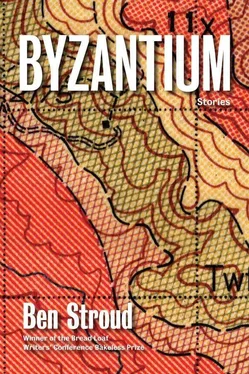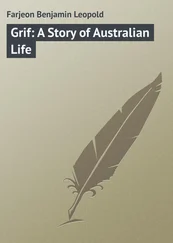“Come on!” she shouted over the river’s muddy purling, but Josh just stood there.
SHELLY’S FATHER, a preacher, had given up the ministry some years back. He worked at a kiosk in a Dallas mall hustling cell phones, and lived in an upstairs apartment off the freeway. Shelly’s mother had left five years before, settling in Phoenix with a chiropractor and calling Shelly every few months or so to make sure she was still alive — that’s what she actually said, laughing her new dry desert laugh. Their marriage had always been one of silence, kept in place for the benefit of the small congregation of Highpoint Baptist, which occupied a metal-sided building between a bank branch and a gas station. Shelly feared that her parents’ marriage, which had crumbled so soon after her wedding, would somehow corrupt her own, and that first year she had wept often into Josh’s lap, hugging him tight and saying, “Don’t leave me, I’ll never leave you, please don’t leave me.” She was so scared then that someday he would, or she would. It seemed to be the natural order of things.
But Josh, Shelly soon saw, never worried, even with her holding close to him and crying in his lap. He was so caught up with the idea of himself, he seemed unable even to consider the fact that any distance could grow between them, no matter how much he pushed and pushed. True, he could be sweet and loving, but once, when she told him about how she wanted a big yard where she’d grow vegetables and raise chickens, he laughed and said, “You have such small dreams.” She felt the hurt for months. Still, she thought, maybe he was right. Lately he’d been spending his spare time in the bedroom they’d made into his study, determined to find the investment that would make them rich. He had a stack of prospectuses from Brazilian and Philippine companies, the cheap ink on their onionskin pages staining his fingers.
A couple nights before they left for West Texas, Josh cornered Shelly in the apartment’s kitchen and heatedly related his new plan: they would cash out her retirement fund (it was just sitting there now she’d been laid off, he said) and put it in a Philippine mining company he’d found. She knew nothing would come of it. Before his investing phase, he’d taken art classes at night and ended up with two drawings in a show at the community center in Grapevine. For a month after the show he’d talked of moving to the Virgin Islands, where he’d paint while she taught, and then the art phase had fizzled. But what struck her as she stood in the kitchen, cradling a mug of coffee while he gesticulated, was that his plans never allowed much room for her beyond ponying up money or holding the day job. She’d never realized that before — and she wasn’t asking for much, after all, only a yard and chickens. It was then, leaning against the refrigerator as she sipped her coffee, pretending to listen as Josh talked about manganese, that she first imagined life on her own, held that possibility against the vision of the path with the sun behind it. The path seemed less inviting now.
Standing in the kitchen, Josh had been looking at her, waiting for an answer to a question she hadn’t heard. She put away her meandering thoughts and asked him to repeat what he’d said. Because this too she’d learned from her parents’ marriage: that you can make a mistake and not know it for years and years. And even more terrifying, never learn what the mistake was, just feel its misery coming down on you for the remainder of your life. Sometimes her father claimed that marrying her mother was the mistake, other times it was letting her go. Mostly they didn’t discuss it.
SHELLY WALKED OVER TO THE BURRO. The animal was nosing at the roots of a small tree, pulling up bits of grass. When she got close, it huffed and trotted away a few feet. Victor and the other men weren’t paying attention to her now — Victor was watching the trail with his binoculars.
“Come back!” Josh shouted over the river. He was flapping his hand, motioning for her to cross. At first she thought he was only embarrassed, but now she saw he was scared. “Please.”
Then Victor started singing again. More people were coming down the trail. Fine, she thought, and crashed through the water once more, the river silky and cool, the current pushing her a little as she crossed to her husband’s side. It was as simple as she’d said.
No one had leapt out at her, no sharpshooter hidden in the canyon face had fired. Josh hugged her, more tightly than usual, but her clasp was weaker, and she pulled away first.
“What’s the big deal?” she said. Victor was still singing, and, over Josh’s shoulder, she could see the passel of tourists coming down the hill, a fat man in a floppy hat at their head.
AFTER THE HIKE they drove over to the camp store, where Josh waited while Shelly took a pay-shower. The water was good and hot, and when she finished she dried herself with one of the towels they’d brought. She dressed and then went outside and sat under the metal awning, her hair still wet. She thought about the big lawn, the chickens running underfoot as she went to her tomato plants, basket in hand. Last week a friend from college had told her about an opening at her school in Waxahachie.
The day was in its full heat, but the shade made it pleasant, and every few seconds a breeze rose, coming across the parking lot and empty campsites. No one camped near the river. Everyone, like them, was up in the Chisos Basin, with the red mountains rising around them, where it was cooler. Josh sat next to her. Together they watched a roadrunner trot across the asphalt, then a rabbit came out from some brush and gnawed on a dandelion.
Later, at the campsite, Josh cooked a can of Dinty Moore over the propane stove. When the stew was warm, he poured it into their plastic bowls, passing one to Shelly. She took her spoon, lifted a chunk of meat to her lips, cooled it with her breath, then ate.
“I’m leaving when we get back,” she said after she swallowed.
“What?” Josh said. They had neighbors — a couple with a backpacking tent on one side, three middle-aged men in a camper on the other — and she could tell what Josh was thinking. His face was darkening. Not here, he wanted to say. Not now. He wanted her to grin and say it was a joke. But she said nothing and finished the Dinty Moore. He would carry his stunned, sick heart through the next hours in silence, she knew, and then, once they were alone again, in their tent, and the night was finally quiet, their loud, beer-drinking neighbors safely retreated to their RV, he would try to wake her, whisper her back, believing it that simple, and she’d keep her eyes shut and pretend to be asleep.
MOTA STUDIED THE MAP as the viceroy’s plump, pink finger traced the line of peaks into the far reaches of the northwestern frontier. “Here,” the viceroy said, stopping his finger in a wide stretch of empty parchment. “This is where he says it is.”
The viceroy was sitting in his sedan chair, held above the greenest lawn in all of New Spain by a pair of smooth-skinned guinea bucks. Women in meringue-pale dresses strolled past, followed by dandies with needle-thin swords at their waists. Parrots and quetzals squawked in brass cages hung among the trees, stretched their feathers against the wire bars.
“And you believe him, Excellency?” Mota asked.
“He gave me proof,” the viceroy said. “Listen. Ninety pesos to the quintal, sixty thousand marks of silver a year. The mine is too rich to ignore.” He leaned farther out, causing the front bearer’s knees to buckle, and tapped Mota on the chest. “I want you to claim it.”
MOTA HAD BEEN AN INSPECTOR OF MINES for the Royal Audiencia for ten years. It was not the career he had intended for himself. At Salamanca his sole friend, the third son of the Duke of Córdoba, had fed him stories of the New World: ribbons of ore, impatient creole virgins, the moon hanging low above a hacienda. So he had come, securing a minor post copying letters in the Audiencia and envisioning a future that already seemed set. He would become rich without thinking and live out his days growing fat in a creole palace, tickling his mistress each night while his wife whelped a child a year. Debarking at Veracruz, he had bribed the customs men and the men from the Holy Office — whose long fingers spidered every passenger’s books — so that he might hurry toward this new life in the city of Mexico.
Читать дальше











